(完整)初二英语一般将来时讲解及练习
人教版英语八上时态专讲--一般将来时讲义+习题

人教版英语八上时态专讲--一般将来时讲义+习题一般将来时一般将来时表示将来某一时段的动作或状态,或将来某一段时间内经常的动作或状态。
Will+be will+do含义:一般将来时表示将来某一时刻的动作或状态,或将来某一段时间内经常的动作或状态。
结构:①Will/shall+动词原形肯定句:主语+will/shall+动词原形+其他否定句:主语+will/shall+not+动词原形+其他一般疑问句:Will/Shall+主语+动词原形+其他肯定回答:Yes,主语+will/shall;否定回答:No,主语+will/shall not.特殊疑问句:特殊疑问词+一般疑问句②be going to+动词原形肯定句:主语+be(is/am/are)+going to+其他否定句:主语+be(is/am/are)+not+going to+其他一般疑问句:Be(Is/Are)+主语+going to+其他? 肯定回答:Yes,主语+be/否定回答:No,主语+be not.特殊疑问句:特殊疑问词+一般疑问句表示将来的时间状语:tomorrow(明天), next week(下周);in the future(将来);in a year(一年以后)等。
一般将来时由助动词shall(第一人称),will(所有人称)动词原形构成。
美式英语则不管什么人称,一律用will。
或用主语+be动词 + going to 动词(be going to)复习:用法:一般将来时表示将来某一时段的动作或状态,或将来某一段时间内经常的动作或状态。
在英语时态中,"时"指动作发生的时间,"态"指动作的样子和状态。
表示将来的时间状语:tomorrow,the day after tomorrow,tomorrowmorning/afternoon/evening/next/year/week/month/hour/ in+一段时间,in the future等连用。
人教版英语八年级上册Unit7一般将来时语法详解及练习

Unit7 will一般将来时详解一、概念:表示将要发生的动作或存在的状态及打算、计划或准备做某事。
句中一般有以下时间状语:tomorrow, next day(week, month, year…),soon, the day after tomorrow(后天),in the future, from now(从今后),in+一段时间(在...时间之后)in 3 days 等。
二、基本结构:②will+ do.三、否定句:will后加not成will not =won’t。
will not=won’t四、一般疑问句:will提到句首,some改为any, and改为or,第一二人称互换。
五、同义句:be going to = willI am going to go swimming tomorrow. = I will go swimming tomorrow.六、“There be”句型的一般将来时肯定句:There will be+名词=There is/are going to be[注意]:无论后面加单数名词或复数形式,be都必须用原形。
There will be only one country.否定句:There won’t be only one country.一般疑问句:Will there be only one country?Yes,there will./No,there won’t.专项训练1一、单项选择1. I hope you ________a good time this evening.A. haveB. are havingC. will haveD. has2. There________ a basketball match this afternoon.A. will haveB. will beC. hasD. have3. We________to the park if it is fine tomorrow.A. will goB. goC. goesD. went4. The kids may not go to school in the future. They ________at home on computers.A. have studiedB.will studyC. studiedD. studies5. -Shall we hang out in Great Bazzar tomorrow?-I’m afraid not. ________the final game of the World Cup on TV.A. There isB. There will beC. There will haveD. There is going to have二、句型转换1. Students will go to school in the future.(一般疑问句) ________ _______ _______ to school in the future?2.There will be some robots in our homes.(否定句) There _______ ______ _______robots in our homes.3.My sister will go camping with her friends.(否定句) My sister ________ _______camping with her friends.4.Mike will visit his grandparents next weekend.(一般疑问句,肯定回答)_______Mike_______his grandparents next weekend? Yes, ________ _______.5.There will be more wild animals in the forest.(一般疑问句,否定回答)______ _____ ______more wild animals in the forest? No, _______ _______.专项训练2( ) 1. If they come, we ________ a meeting. A. have B. will have C. had D. would have ( ) 2. He ________ her a beautiful hat on her next birthday.A. givesB. gaveC. will givingD. is going to giving( ) 3. He ________ in three days.A. coming backB. came backC. will come backD. is going to coming back( ) 4. ________ a concert next Saturday?A. There will beB. Will there beC. There can beD. There are( ) 5. There ________ a birthday party this Sunday.A. shall beB. will beC. shall going to beD. will going( )7. There ___ a talk show on CCTV 3 at eight tonight.A. will haveB. is going to beC. is havingD. is going to have( )8. I ________ free the day after tomorrow. A. will B. will C. will be D. will am ( ) 9. Mother ________ me a nice present on my next birthday.A. will givesB. will giveC. givesD. give1. Andy will start working when she finishes high school and college.(否定句、一般疑问句、提问)Andy _________ _________ start working when she finishes high school and college.________ Andy _______ working when she finishes high school and college?________ _______ Andy ________ working?2. We will meet at the bus stop at 10:30.(改一般疑问句)_______ ________ meet at the bus stop at 10:30?。
初二 一般将来时知识点总结加练习题
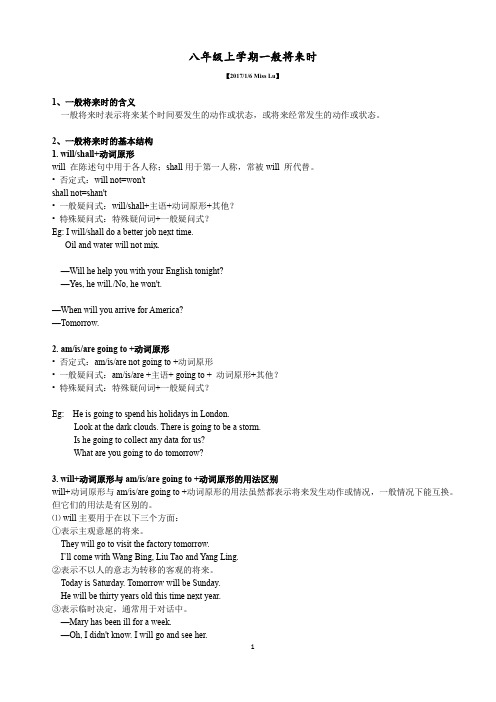
八年级上学期一般将来时【2017/1/6 Miss Lu】1、一般将来时的含义一般将来时表示将来某个时间要发生的动作或状态,或将来经常发生的动作或状态。
2、一般将来时的基本结构1. will/shall+动词原形will 在陈述句中用于各人称;shall用于第一人称,常被will 所代替。
•否定式:will not=won'tshall not=shan't•一般疑问式:will/shall+主语+动词原形+其他?•特殊疑问式:特殊疑问词+一般疑问式?Eg: I will/shall do a better job next time.Oil and water will not mix.—Will he help you with your English tonight?—Yes, he will./No, he won't.—When will you arrive for America?—Tomorrow.2. am/is/are going to +动词原形•否定式:am/is/are not going to +动词原形•一般疑问式:am/is/are +主语+ going to + 动词原形+其他?•特殊疑问式:特殊疑问词+一般疑问式?Eg: He is going to spend his holidays in London.Look at the dark clouds. There is going to be a storm.Is he going to collect any data for us?What are you going to do tomorrow?3. will+动词原形与am/is/are going to +动词原形的用法区别will+动词原形与am/is/are going to +动词原形的用法虽然都表示将来发生动作或情况,一般情况下能互换。
人教版英语八年级上册Unit 6-7Grammar一般将来时语法讲解+练习(含答案)

人教版八年级上册Unit 6 - 7 Grammar一般将来时姓名:_________定义表示将来某一时段的动作或状态;表示将来某一段时间内经常的动作或状态。
例:1)She will have a daughter. 她就快有个女儿了。
2)Call me this evening. I’ll be at home. 今晚给我打电话,我会在家。
结构英语时态通过谓语动词的变形来体现,一般将来时的谓语构成有以下几种情况:will + V原(该结构表示将来某个时间将要发生的动作或状态)【注1】will可以缩写为’ll,如:I will = I’ll he will = he’ll【注2】will不涉及第三人称单数的变形,只有一种形式,后面加动词原形。
例:I will visit Mr. Brown next week. 下周我将去拜访布朗先生。
He will go to Beijing next year. 他明年要去北京。
be going to + V原(该结构表示事先考虑过的将要发生的动作,或已有迹象表明将要发生的某事,意为“打算”、“就要”)例:There is going to be a basketball match tomorrow. 明天会有一场篮球比赛。
We’re going to go on vacation in Sanya this winter. 这个冬天我们计划去三亚度假。
There are lots of dark clouds. It is going to rain. 天上乌云密布,快要下雨了。
be doing,现在进行时表将来。
表示位置转移的动词(如go, come, leave, start, arrive等),可以用现在进行时表将来。
例:They’re leaving for Chongqing. 他们即将前往北京。
The bus is coming. 公交车就要来了。
初二英语一般将来时讲解及练习

初二英语一般将来时讲解及练习讲解一般将来时表示将来某个时间或某个动作或状态一定会发生或存在的情况。
在英语中,一般将来时的构成主要有两种形式:will/shall + 动词原形和be going to + 动词原形。
will/shall + 动词原形will/shall + 动词原形是一般将来时的最基本形式。
其中,will通常用于第一人称,shall通常用于第二和第三人称。
例如:I will go to the party tomorrow.(我明天去参加聚会。
)He will finish his homework after dinner.(他晚饭后完成他的作业。
)They will have a picnic in the park next weekend.(他们下周末在公园野餐。
)be going to + 动词原形be going to + 动词原形表示将要发生或存在的事情,通常用于未来的计划、意图或打算。
例如:I am going to study abroad next year.(我明年要去留学。
)She is going to visit her grandparents this weekend.(她这个周末要去看她的祖父母。
)We are going to have a meeting next week.(我们下周要开会。
)注意:在使用be going to + 动词原形时,要注意主语和be动词之间的一致性。
例如:He is going to play football.(他将要去踢足球。
)而不能说:He are going to play football.练习题一、用一般将来时填空I (visit) my grandparents next weekend.They (have) a party next Saturday.He (be) a doctor when he grows up.We (travel) to Europe next summer.She (write) a novel someday.They (move) to a new house next month.I (study) hard so I can get into a good college. He (play) the piano at the concert next week. We (have) a meeting tomorrow morning. She (graduate) from high school in two years.二、将下列句子变为一般将来时I study English every day. _She teaches math at the high school.They are going to the movies tonight.He likes to read books in his free time. ___ We have dinner at six o'clock every evening. _ The train arrives at 8:00 in the morning. __ She sings in the choir on Sundays.They play soccer after school. ___He works at a restaurant on weekends. ____ We visit our grandparents once a month. __ 三、用一般将来时完成下列对话A: What are you going to do this weekend? B: I'm going to visit my grandparents.A: That sounds nice. Where do they live?B: They live in the countryside.A: What are you going to do there?B: We're going to have a picnic and go fishing.A: That sounds like fun. Are you going with your parents?B: Yes, my parents and my younger brother are coming too.A: Have a great time!B: Thank you, we will!四、阅读理解My Future PlansMy name is Jack and I'm a sophomore in high school. I have a lot of plans for my future. First of all, I want to go to a good college and study business. I have always been interested in business and I think I would be good at it. After graduation, I plan to start my own business.I want to own a restaurant that serves healthy and delicious food.In order to achieve my goals, I need to work hard in school and get good grades. I also need to learn about managing money and running a business. I have been studying these topics on my own and I plan to take some courses in college.I know it won't be easy, but I'm determined to succeed. I believe that if I work hard and stay focused, I can achieve anything I want.What does Jack want to study in college?What does Jack plan to do after graduation?What kind of restaurant does Jack want to own?What does Jack need to do in order to achieve his goals?What does Jack believe?答案:Jack wants to study business in college.Jack plans to start his own business after graduation.Jack wants to own a restaurant that serves healthy and delicious food.Jack needs to work hard in school, get good grades, learn about managing money and running a business, and take courses in college.Jack believes that if he works hard and stays focused, he can achieve anything he wants.。
一般将来时讲解(附习题+答案)

一般将来时讲解(附习题+答案)一、一般将来时的含义:表示动作发生在将来二、一般将来时的句型:(1) will/shall+动词原形(2) be going to+动词原形三、一般将来时的时间状语:tomorrow(明天)、the day after tomorrow(后天)、next...(下一...): next week(下一周)、next year(明年)、next month(下个月)in+一段时间(...之后): in three days(三天之后)、in the future在未来this evening(今天晚上)四、一般将来时的句型结构:(1) will/shall+动词原形(will not =won’t)(will 各种人称均可用,shall 只能用于第一人称)1)肯定句:主语+will/shall+动词原型...如:I will go to school tomorrow.我明天将会去学校He will go to school tomorrow.他明天将会去学校。
2)否定句:主语+will/shall+not+动词原型...如:I won’t go to school tomorrow.我明天将不会去学校。
He won’t go to school tomorrow.他明天将不会去学校。
3)一般疑问句:Will/Shall +主语+动词原型...如:Will you go to school tomorrow?你明天要去学校吗?Will he go to school tomorrow?他明天要去学校吗?肯定回答:Yes, 主语+will.如:Yes, I will.Yes, he will.否定回答:No,主语+will+not.如:No, I won’t.No, he won’t.4) 特殊疑问句:特殊疑问词+will/shall+主语+动词原型...如:What will you do tomorrow?你明天将会做什么?What will he do tomorrow?他明天将会做什么?(2) be going to+动词原形1)肯定句:主语+be going to +动词原型...如:I am going to buy some books tomorrow.我明天打算去买一些书。
初中一般将来时讲义【含答案】
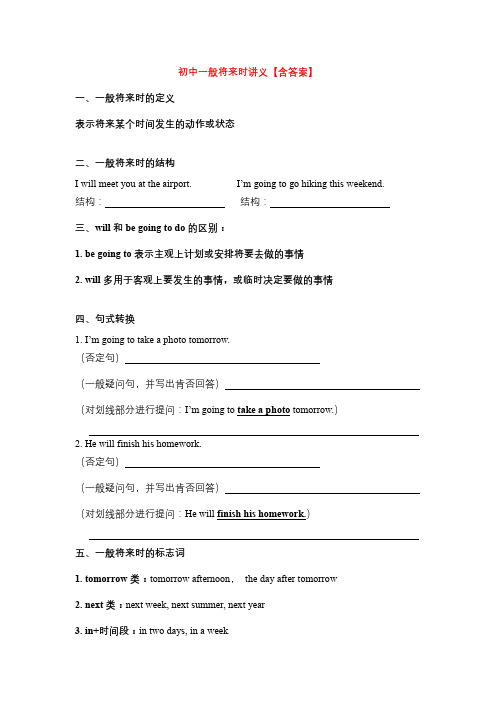
初中一般将来时讲义【含答案】一、一般将来时的定义表示将来某个时间发生的动作或状态二、一般将来时的结构I will meet you at the airport. I’m going to go hiking this weekend.结构:结构:三、will和be going to do的区别:1. be going to表示主观上计划或安排将要去做的事情2. will多用于客观上要发生的事情,或临时决定要做的事情四、句式转换1. I’m going to take a photo tomorrow.(否定句)(一般疑问句,并写出肯否回答)(对划线部分进行提问:I’m going to take a photo tomorrow.)2. He will finish his homework.(否定句)(一般疑问句,并写出肯否回答)(对划线部分进行提问:He will finish his homework.)五、一般将来时的标志词1. tomorrow类:tomorrow afternoon,the day after tomorrow2. next类:next week, next summer, next year3. in+时间段:in two days, in a week4.其他:in the future, one day, someday【课堂练习】1. We don’t know when __________ next week. Please call me when he arrives.A. will he arriveB. does he arriveC. he will arriveD. he arrives2. —How soon will he come back to Guangzhou?—I have no idea. Maybe he __________ in one or two days.A. will comeB. comesC. comeD. came3. ---will the train arrive?---It the station in 50 minutes.A. How soon; will get toB. How soon; arriveC. How long; will reachD. How far; gets to4. Will you at the bus stop at 10:30?A. meetingB. meetsC. meetD. met5. Lily and I to the concert it we free next week.A. go; areB. go; will beC. will go; will beD. will go; are初中一般将来时讲义(答案)一、一般将来时的定义表示将来某个时间发生的动作或状态二、一般将来时的结构I will meet you at the airport. I’m going to go hiking this weekend.结构:will+动词原形结构:am/is/are going to+动词原形三、will和be going to do的区别:1. be going to表示主观上计划或安排将要去做的事情2. will多用于客观上要发生的事情,或临时决定要做的事情四、句式转换1. I’m going to take a photo tomorrow.(否定句)I’m not going to take a photo tomorrow.(一般疑问句,并写出肯否回答)---Are you going to take a photo tomorrow?---Yes, I am. / No, I’m not.(对划线部分进行提问:I’m going to take a photo tomorrow.)What are you going to do tomorrow?2. He will finish his homework.(否定句)He will not finish his homework.(一般疑问句,并写出肯否回答)---Will he finish his homework?---Yes, he will. /No, he won’t.(对划线部分进行提问:He will finish his homework.)What will he do?五、一般将来时的标志词1. tomorrow类:tomorrow afternoon,the day after tomorrow2. next类:next week, next summer, next year3. in+时间段:in two days, in a week4.其他:in the future, one day, someday【课堂练习】1. We don’t know when __________ next week. Please call me when he arrives.A. will he arriveB. does he arriveC. he will arriveD. he arrives2. —How soon will he come back to Guangzhou?—I have no idea. Maybe he __________ in one or two days.A. will comeB. comesC. comeD. came3. ---will the train arrive?---It the station in 50 minutes.A. How soon; will get toB. How soon; arriveC. How long; will reachD. How far; gets to4. Will you at the bus stop at 10:30?A. meetingB. meetsC. meetD. met5. Lily and I to the concert it we free next week.A. go; areB. go; will beC. will go; will beD. will go; are。
一般将来时详解及练习

it'll,we'll,you'll,they'll。
'll,并与主语连写在一起,如:I'll,he'll,注:will 常简略为一、定义:表示将要发生的动作或存在的状态及打算、计划或准备做某事。
二、基本构成:①be going to +do.打算做某事一般将来时态:eg:I’m going to be a singer.我打算成为一名歌手。
She is going to learnEnglish.她打算去学习英语。
②will /shall +动词原形这种方法一般单纯地表示将来某个时间将要发生的动作或存在的状态。
will 用于各种人称;shall 只用于第一人称。
eg:I will /shall go to visit him next week.下周我将去拜访他。
What time shall we go there tomorrow?明天我们几点去那儿?③否定句:在be动词(am,is,are)后加not或情态动词will后加not构成won’t。
例如:I’m going to have a picnic this afternoon.→I’m not going to have a picnic this afternoon.④一般疑问句:be或will提到句首,some改为any,and改为or,第一二人称互换。
例如:We are going to go shopping this weekend.→Are you going to go shopping this weekend?⑤对划线部分提问:一般情况,一般将来时的对划线部分有三种情况。
1、问人。
Who例如:I’m going to New York soon.→Who’s going to New York soon?2、问干什么。
What…do例如:My father is going to watch football games with methis afternoon.→What is your father going to do with you this afternoon?3、问什么时候。
2024年中考英语一般将来时详解以及练习
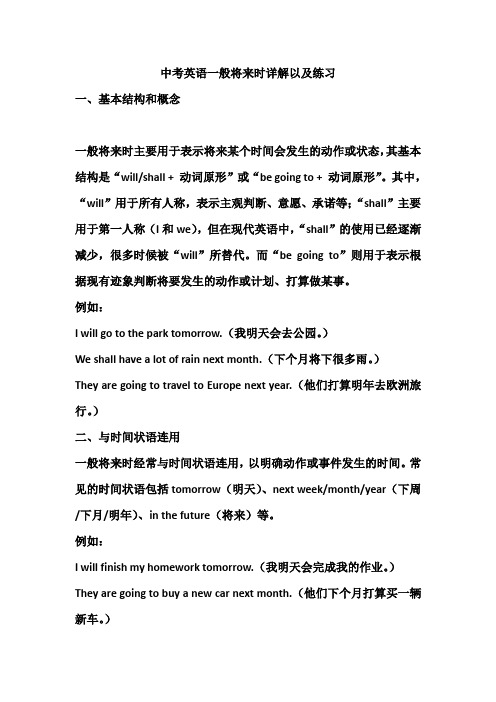
中考英语一般将来时详解以及练习一、基本结构和概念一般将来时主要用于表示将来某个时间会发生的动作或状态,其基本结构是“will/shall + 动词原形”或“be going to + 动词原形”。
其中,“will”用于所有人称,表示主观判断、意愿、承诺等;“shall”主要用于第一人称(I和we),但在现代英语中,“shall”的使用已经逐渐减少,很多时候被“will”所替代。
而“be going to”则用于表示根据现有迹象判断将要发生的动作或计划、打算做某事。
例如:I will go to the park tomorrow.(我明天会去公园。
)We shall have a lot of rain next month.(下个月将下很多雨。
)They are going to travel to Europe next year.(他们打算明年去欧洲旅行。
)二、与时间状语连用一般将来时经常与时间状语连用,以明确动作或事件发生的时间。
常见的时间状语包括tomorrow(明天)、next week/month/year(下周/下月/明年)、in the future(将来)等。
例如:I will finish my homework tomorrow.(我明天会完成我的作业。
)They are going to buy a new car next month.(他们下个月打算买一辆新车。
)三、表示打算、预测或推断除了表示单纯的将来事实外,一般将来时还可以用于表达打算、预测或推断。
这种用法常常与“will probably/maybe”等情态动词连用,以增加表达的准确性或不确定性。
例如:She will probably pass the exam.(她可能会通过考试。
)It will rain tomorrow, so we may stay at home.(明天会下雨,所以我们可能会待在家里。
英语一般将来时技巧和方法完整版及练习题含解析
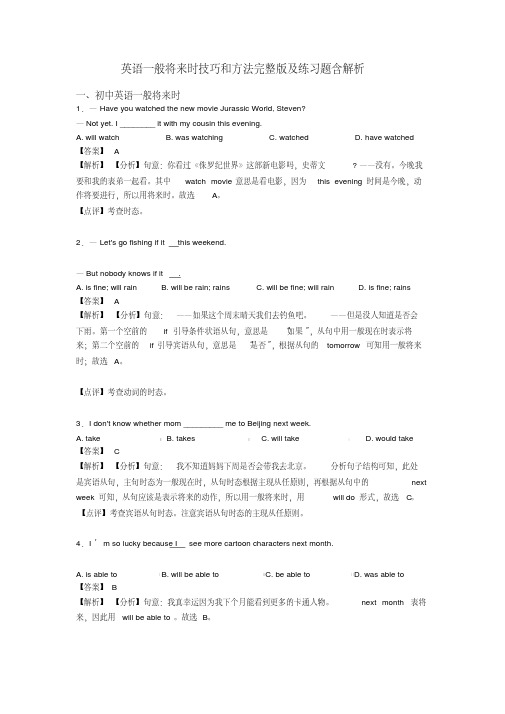
英语一般将来时技巧和方法完整版及练习题含解析一、初中英语一般将来时1.— Have you watched the new movie Jurassic World, Steven?— Not yet. I ________ it with my cousin this evening.A. will watchB. was watchingC. watchedD. have watched 【答案】 A【解析】【分析】句意:你看过《侏罗纪世界》这部新电影吗,史蒂文? ——没有。
今晚我要和我的表弟一起看。
其中watch movie意思是看电影,因为this evening 时间是今晚,动作将要进行,所以用将来时。
故选A。
【点评】考查时态。
2.— Let's go fishing if it this weekend.— But nobody knows if it .A. is fine; will rainB. will be rain; rainsC. will be fine; will rainD. is fine; rains 【答案】 A【解析】【分析】句意:——如果这个周末晴天我们去钓鱼吧。
——但是没人知道是否会下雨。
第一个空前的if引导条件状语从句,意思是“如果”,从句中用一般现在时表示将来;第二个空前的if引导宾语从句,意思是“是否”,根据从句的tomorrow可知用一般将来时;故选A。
【点评】考查动词的时态。
3.I don't know whether mom _________ me to Beijing next week.A. takeB. takesC. will takeD. would take 【答案】 C【解析】【分析】句意:我不知道妈妈下周是否会带我去北京。
分析句子结构可知,此处是宾语从句,主句时态为一般现在时,从句时态根据主现从任原则,再根据从句中的next week可知,从句应该是表示将来的动作,所以用一般将来时,用will do形式,故选C。
(完整word版)一般将来时态讲解及练习和答案

1、概述一般将来时表示将来某个时间要发生的动作或存在的状态,常与表示将来的时间状语连用,如tomorrow,next week,next year等。
Why don’t you put the meat in the fridge? It will stay fresh for several days.为什么不把肉放在冰箱里?它可以保鲜好几天。
—You’ve left the light on。
你忘了关灯了。
- Oh , so I have。
I'll go and turn it off。
噢,那我马上去关.2、构成一般将来时由“助动词will/shall+动词原形”构成。
will用于第二、三人称,shall第一人称。
在口语中,will在名词或代词后常缩写为’ll,will not简缩为won’t[wount]。
但在美国英语中,各种人称皆可用will。
He will help his sister with her lessons。
他将帮助他妹妹做功课.We won’t be free this afternoon.今天下午我们没空。
3、一般将来时的用法(1)表示未来的动作或存在状态,常与表示将来的时间状语连用,如tomorrow, next Sunday, soon,in a month, in the future等。
We shall leave for London next Monday.我们将在下周一去伦敦。
He will come to see you the day after tomorrow.后天他要来看你。
You will be 20 next year。
明年你就二十了。
(2)表示将来反复发生的动作或习惯性动作We shall come and work in this factory every year.我们将每年来这工厂参加劳动。
The students will have five English classes per week this term.本学期学生每周将要上五节英语课。
初二英语一般将来时讲解及练习

初二英语一般将来时讲解及练习一般将来时的定义是指表示将来某一时间将要发生的动作或存在的状态,也可以表示将来经常或重复发生的动作。
一般将来时的标志词包括明天、后天、明年、下一个月、下一个星期等。
一般将来时的构成有两种形式,一种是主语+be(am,is,are) going to+do+。
另一种是主语+will/shall+do+。
其中,will和shall可以互换使用,但shall只能用于第一人称,即主语是I 或we。
后面接动词原形。
肯定句的构成可以是主语+be(am,is,are) going to+do+。
或者主语+will/shall+do+。
否定句则是在be动词(am。
is。
are)后加not或will后加not成won’t。
例如,明天我将要踢足球可以表示为I am going to play football tomorrow或者I will play XXX。
而明天我不将踢足球则可以表示为I am not going to play XXX。
另外,明年她不将参观上海可以表示为She is not/isn't going to visit Shanghai next year。
2.A) I will not go to school the day after tomorrow。
B) I XXX。
C) XXX.3.1)A) Am I going to see my XXX。
Yes。
you are。
B) Are you going to listen to the tape tomorrow。
No。
I'm not。
C) Is she going to Beijing next year。
Yes。
she is.2)A) XXX class。
Yes。
you will。
B) Will you come here next week。
Yes。
I will。
C) Will she teach us this term。
人教版英语八年级上册 Unit6-7语法重点:一般将来时_专项讲解与练习 (有答案)
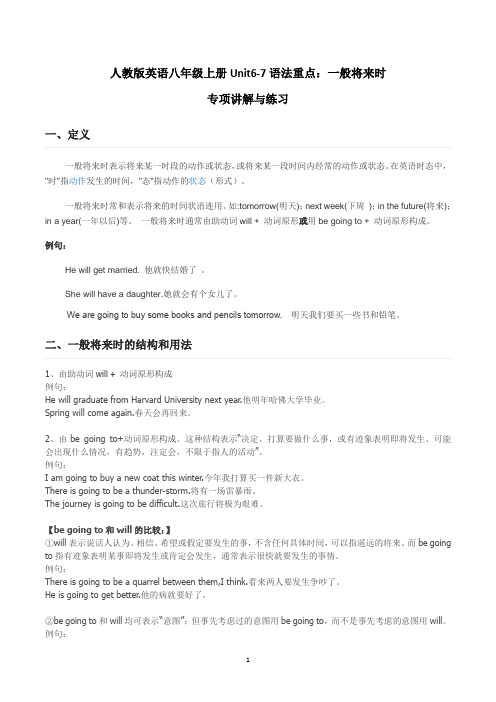
人教版英语八年级上册Unit6-7语法重点:一般将来时专项讲解与练习一般将来时表示将来某一时段的动作或状态,或将来某一段时间内经常的动作或状态。
在英语时态中,"时"指动作发生的时间,"态"指动作的状态(形式)。
一般将来时常和表示将来的时间状语连用。
如:tomorrow(明天);next week(下周);in the future(将来);in a year(一年以后)等。
一般将来时通常由助动词will + 动词原形或用be going to + 动词原形构成。
例句:He will get married. 他就快结婚了。
She will have a daughter.她就会有个女儿了。
We are going to buy some books and pencils tomorrow. 明天我们要买一些书和铅笔。
1、由助动词will + 动词原形构成例句:He will graduate from Harvard University next year.他明年哈佛大学毕业。
Spring will come again.春天会再回来。
2、由be going to+动词原形构成。
这种结构表示“决定、打算要做什么事,或有迹象表明即将发生、可能会出现什么情况,有趋势,注定会,不限于指人的活动”。
例句:I am going to buy a new coat this winter.今年我打算买一件新大衣。
There is going to be a thunder-storm.将有一场雷暴雨。
The journey is going to be difficult.这次旅行将极为艰难。
【be going to和will的比较:】①will表示说话人认为、相信、希望或假定要发生的事,不含任何具体时间,可以指遥远的将来。
而be going to指有迹象表明某事即将发生或肯定会发生,通常表示很快就要发生的事情。
(完整版)八年级上册一般将来时用法讲解及练习
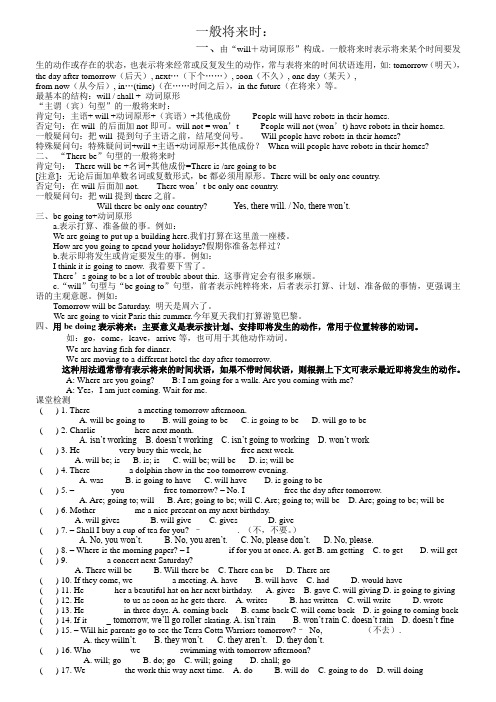
一般将来时:一、由“will+动词原形”构成。
一般将来时表示将来某个时间要发生的动作或存在的状态,也表示将来经常或反复发生的动作,常与表将来的时间状语连用,如: tomorrow(明天),the day after tomorrow(后天), next…(下个……), soon(不久), one day(某天),from now(从今后), in…(time)(在……时间之后),in the future(在将来)等。
最基本的结构:will / shall + 动词原形“主谓(宾)句型”的一般将来时:肯定句:主语+ will +动词原形+(宾语)+其他成份People will have robots in their homes.否定句:在will 的后面加not即可。
will not = won’t People will not (won’t) have robots in their homes.一般疑问句:把will 提到句子主语之前,结尾变问号。
Will people have robots in their homes?特殊疑问句:特殊疑问词+will +主语+动词原形+其他成份?When will people have robots in their homes?二、“There be”句型的一般将来时肯定句:There will be +名词+其他成份=There is /are going to be[注意]:无论后面加单数名词或复数形式,be都必须用原形。
There will be only one country.否定句:在will后面加not. There won’t be only one country.一般疑问句:把will提到there之前。
Will there be only one country? Yes, there will. / No, there won’t.三、be going to+动词原形a.表示打算、准备做的事。
- 1、下载文档前请自行甄别文档内容的完整性,平台不提供额外的编辑、内容补充、找答案等附加服务。
- 2、"仅部分预览"的文档,不可在线预览部分如存在完整性等问题,可反馈申请退款(可完整预览的文档不适用该条件!)。
- 3、如文档侵犯您的权益,请联系客服反馈,我们会尽快为您处理(人工客服工作时间:9:00-18:30)。
一般将来时讲解与练习一.一般将来时的定义:表将来某一个时间将要发生的动作或存在的状态,也表示将来经常或重复发生的动作.二.一般将来时的标志词:tomorrow(明天),the day after tomorrow(后天)next year(明年)next month(下一个月)next week(下一个星期)三.一般将来时的构成:①be going to + do;②will+ do.1.主语+be(am,is,are) going to+do+......例如:(1).I am going to play football tomorrow.明天我将要踢足球.(2).She is going to watch a movie the day after tomorrow.后天她要看一场电影.2.主语+will/shall+do+.....** ***说明:(1).will/shall有时可以和be going to 互换;(2).will是万能的,shall只能用在第一人称,主语是I,we.(3).will和shall的后面接动词原形)例如:(1).I shall/will go to Beijing next month.(I will=I'll)下个月我将要去北京.(2).You will come to see me tomorrow.(you will=you'll)明天你将要来看我.(3).She will read English tomorrow morning.(She will=She'll)明天早上她将要读英语.四.句一般将来时的式:1.肯定句:(1)..主语+be(am,is,are) going to+do+......(2)..主语+will/shall+do+.....2.否定句: 在be动词(am, is, are)后加not或will后加not成won’t。
(1)..主语+be(am,is,are) not going to+do+......例如:(A): I am not going to play basketball tomorrow. 明天我不将踢足球.(B). She is not/isn't going to visit Shanghai next year. 明年她不将参观上海.(2)..主语+will/shall not+do+.....(A). I shall not go to school the day after tomorrow。
后天我不将上学了(B). I will not write my homework this evening.(will not=won't)今晚我不将写作业(C). She will not see a movie next week.(will not=won't)下个星期她将不看一场电影.3.一般疑问句:be或will提到句首,some改为any, and改为or,第一二人称互换。
(1).Am/Is,Are+主语+going to+do+....例如(A). --Am I going to see my grandfather tomorrow?明天我将去看我的爷爷吗?--Yes,you are.是的,你将去.(B).-- Are you going to listening to the tape tomorrow?明天你将听录音带吗?---No,I am not.不,我不将.(C). --Is she going to Beijing next year? 明年我将去北京吗?--Yes,she is. 是的,她将.(2).Will//shall+主语+do+...例如(A). --Shall we play volleyball next class? 下一节课我们将打排球吗?--Yes,you will. 是的,你们将.(B). --Will you come here next week? 下个星期你将来这儿吗?--Yes,I will. 是的,我将.(C).--Will she teach us this term? 这学期,她将教我们吗?--Yes,she will. 是的,她将.4.特殊疑问句:(1).What(Where,How...)+be(am,is,are)+主语+going to+do+...?例如:(A).--What are you going to do tomorrow? 明天你将要做什么?--I'm going to the park? 我将要去动物园.(B).--Where are you going to swim? 你将要去哪儿游泳?--I'm going to swim in the river.(2). What(When,Where,How...)+will+主语+do+...?例如:(A).---What will you do next week?下个星期你将要做什么?---I will do my homework。
我将要做作业.(B).--How will she come here tomorrow? 明天她将要怎么来这儿?--She will come here by bus。
她将要乘公共汽车来这儿.对划线部分提问。
一般情况,一般将来时的对划线部分有三种情况。
1. 问人。
Who例如:I’m going to New York soon.→Who’s going to New York soon.2. 问干什么。
What … do.例如:My father is going to watch a race with me this afternoon.→What is your father going to do with you this afternoon.3. 问什么时候。
When.例如:She’s going to go to bed at nine.→When is she going to bed?同义句:be going to = willI am going to go swimming tomorrow(明天).= I will go swimming tomorrow.be going to和will 的区别be going to主要用于:1)表示事先经过考虑、安排好打算要做的事情。
I’m going to play the violin.2)表示根据目前某种迹象判断,某事非常有可能发生。
Look! There come the dark clouds. It is going to rain.will主要用于在以下几个方面:1、表示单纯的未来“将要”通用各个人称。
eg:They will go to visit the factory tomorrow.2、表示不以人的意志为转移的自然发展的未来的事。
eg:Today is Saturday. Tomorrow will be Sunday.3、will还可表意愿。
问对方是否愿意做某事或表示客气地邀请或命令。
eg:Will you please turn on the radio? 请打开收音机好吗?五.补充说明:1.有些词如:go(去),come(来),leave(离开),start(开始)用现在进行时表示将来时.例如:(1)She is coming here tomorrow.她明天将要来这儿.(2).When are you leaving here?你什么时间将要离开这儿?\练习:一、填空。
1. 我打算明天和朋友去野炊。
I ________ _______ _________ have a picnic with my friends.2. 下个星期一你打算去干嘛? 我想去打篮球。
What ________ ________ _________ _________ _________ next Monday?I _______ ________ _______ play basketball.3. 你妈妈这个周末去购物吗?是,她要去买一些水果。
________ your mother _______ ________ go shopping this ___________?Yes, she _________. She ______ ________ __________ buy some fruit.4. 你们打算什么时候见面。
What time _______ you _________ __________ meet?二、改句子。
5. Nancy is going to go camping.(改否定)Nancy ________ going to go camping.6. I’ll go and join them.(改否定)I _______ go ______ join them.7. I’m going to get up at 6:30 tomorrow.(改一般疑问句)________ _______ ________ to get up at 6:30 tomorrow?8. We will meet at the bus stop at 10:30.(改一般疑问句)_______ ________ meet at the bus stop at 10:30?9. She is going to listen to music after school.(对划线部分提问)________ _______ she ________ ________ _________ after school?10. My father and mother are going to see a play the day after tomorrow.(同上) _________ _________ going to see a play the day after tomorrow?三、用所给词的适当形式填空。
11. Today is a sunny day. We __________ (have) a picnic thisafternoon.12. My brother _______________ (go) to Shanghai next week.13. Tom often ____________(go) to school on foot. But today is raining.He ______________ (go) to school by bike.14. What do you usually do at weekends?I usually __________ (watch) TV and __________(catch) insects?15. It’s Friday today. What ________she _________ (do) this weekend?She _________ (watch) TV and _________ (catch) insects.16. What ___________ (do) you do last Sunday?I ____________ (pick) apples on a farm.What ______________ (do) next Sunday?I ______________ (milk) cows.17. Mary ____________ (visit) her grandparents tomorrow.18. Liu Tao ____________ (fly) kites in the playground yesterday.19. David ______________ (give) a puppet show next Monday.20. I ________________ (plan) for my study now.四、选择( ) 1. There __________ a meeting tomorrow afternoon.A. will be going toB. will going to beC. is going to beD. will go to be( ) 2. Charlie ________ here next month.A. isn’t workingB. doesn’t workingC. isn’t going to workingD. won’t work( ) 3. He ________ very busy this week, he ________ free next week.A. will be; isB. is; isC. will be; will beD. is; will be( ) 4. There ________ a dolphin show in the zoo tomorrow evening.A. wasB. is going to haveC. will haveD. is going to be( ) 5. –________ you ________ free tomorrow?–No. I ________ free the day after tomorrow.A. Are; going to; willB. Are; going to be; willC. Are; going to; will beD. Are; going to be; will be ( ) 6. Mother ________ me a nice present on my next birthday.A. will givesB. will giveC. givesD. give( ) 7. –Shall I buy a cup of tea for you?–________. (不,不要。
